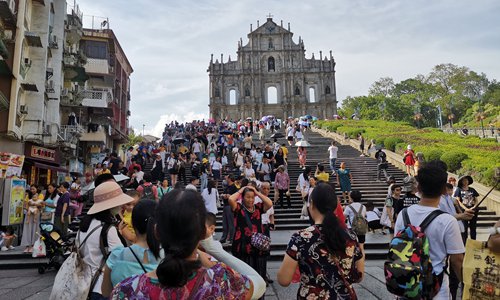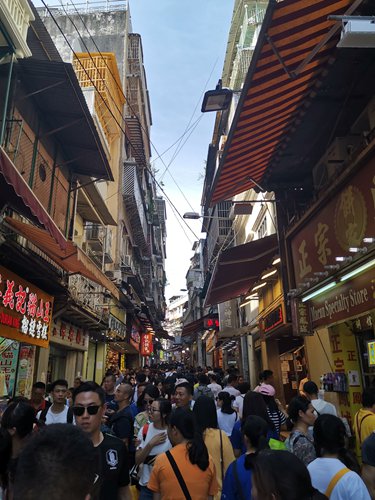HOME >> CHINA
Macao unaffected by HK violence
By Yang Sheng in Macao Source:Global Times Published: 2019/7/26 18:32:18
National security law makes Macao more stable: scholar

Macao's landmark Ruins of St. Paul welcomes tourists on Friday while the Hong Kong international airport experienced an anti-government protest that seriously disrupted operations. Photo: Yang Sheng/GT
Macao, another special administrative region (SAR) of China, is paying attention to the situation in its neighbor Hong Kong, and thanks to better integration and close ties with the mainland and the national security law, Macao is entirely different from Hong Kong's violent and unstable situation, Macao residents said.
Macao and Hong Kong have a similar culture, being Cantonese-speaking regions and geographically close to each other, and many Macao residents also have Hong Kong residency. Macao people can access Hong Kong media, which allow them to pay close attention to the situation in their neighboring city.
On social media platforms like Facebook, some radical Hong Kong protesters recently urged Macao people to join and support them, and even incited Macao people to challenge the central government, but were heavily criticized by Macao web users.
"Back off! This is Macao!" said one in Cantonese, with another one saying, "We won't support people like you [Hong Kong protesters]. You ruined your city and attacked the police and interrupted governance badly. We support HK police."
A Macao taxi driver surnamed Chan told the Global Times that he put a sign on the back seat of his taxi two weeks ago which reads, "Get out! Hong Kong secessionists, you are not welcome," because some young Hong Kong radical protesters wearing black came to Macao and tried to spread their illegal activities.
This is truly offensive, and many other taxi drivers did something similar, he said.
Macao is a major casino town in Asia and the city's economy is based on gambling and tourism, so stability and safety are crucial to the city, Michelle Lam, 26, an employee at a Macao-based casino, told the Global Times.
"There is no reason for Macao people to follow radical forces in Hong Kong to ruin our own city and challenge the country with ridiculous excuses," she said.
Youth reaction
Marco Chan, 24, a graduate of Macao-based University of Saint Joseph, works in the financial industry. He told the Global Times that he sympathized with the Hong Kong opposition group during the Occupy Central movement in 2014, but this time he changed his mind after the anti-establishment forces' endless troublemaking, as opposition won't solve any problem and would only damage public order and social stability.
Carrie Hoi, 24, Marco Chan's classmate who also works in finance, said "maybe we can understand their unhappiness toward the Hong Kong SAR government and they have the right to protest peacefully." But incidents like storming the Legislative Council, attacking the Liaison Office of the Central People's Government in Hong Kong, smearing the national emblem and attacking the police, she said, were "truly terrifying." "They are not solving the problem, but creating problems."
Billy Kwan, executive vice chairman of Macao New Media Alliance, said "even if some young people sympathize with the Hong Kong protesters, when radical protesters try to incite them to do the same thing in Macao they need to know it is impossible. Macao doesn't have a similar environment. Young people here have better living standards and careers."
"The economic situation is fundamental. Young people in Hong Kong are suffering from low income and high rent, but Macao youth enjoy a better environment," said Ben S.V. Leng, managing director of a Macao-based tourism company and also vice chairman of the Association for Promotion of Chinese National Unity.
According to data from the Macao and Hong Kong SAR governments, the median monthly income of young Macao residents was 20,000 Macao pataca ($2,490) in 2018, while in Hong Kong, it's HK$ 13,000 ($1,660).
But rent in Hong Kong is extremely high. Rent for a 28-square-meter studio apartment in the city center is HK$ 12,000 a month.
Chan and Hoi feel for the difficult situation of Hong Kong youth and believe that's partly why so many people get incited.
More successful integration
A scholar at Macau University of Science and Technology and former senior official of the Macao SAR who requested anonymity told the Global Times that although Macao and Hong Kong both implement the "one country, two systems" policy, they are very different in nature, and this is why Macao is more stable and implements the policy more successfully.
The integration between Macao and the mainland started long before the 1999 return from Portugal to China, he said. "The Portuguese colonial government in Macao is not like the UK colonial government in Hong Kong. It left a huge space for the mainland to organize and build civil patriotic organizations in Macao. These patriotic anti-colonialism organizations play a significant role in the city and enjoy a great reputation."
After returning to China, these civil organizations continue to play an important role in assisting the SAR government to boost exchanges and integration with the mainland, and build schools and media to educate the next generation and the public about patriotism and the relationship between the mainland and Macao, the scholar noted.
"Compared to some people in Hong Kong, most Macao people have a strong sense of national identity," he said.
Lam said when they were still in school, they had opportunities to visit the mainland, and patriotic education was successful, even in Christian schools.
Leng said Macao people have witnessed the development of the mainland over the past 40 years, before and after the return, as they are near Zhuhai, a coastal city of Guangdong Province, even closer than Hong Kong.
"People watched the urban construction day by day from Macao, and realize the mainland is more advanced than us and Hong Kong. We have less biases than Hong Kong people on the mainland," Leng said.

A street in the Macao city center bustles with tourists on Friday. Photo: Yang Sheng/GT
National security
Macao returned from Portugal to China in 1999, and the SAR passed the national security law, which took effect on March 3, 2009. The law fulfilled Article 23 of the Macao Basic Law.
The law prohibits and punishes acts of "treason, secession, and subversion" against the Central People's Government, as well as "preparatory acts" leading to any of the three acts.
Unfortunately, the same law in Hong Kong has not yet passed because of opposition from anti-establishment forces in Hong Kong. It failed to pass in 2003. Some Macao observers believe the law is a main reason why Hong Kong cannot prevent interference from foreign forces effectively.
The scholar from Macau University of Science and Technology said this is truly significant, because it can stop interference from foreign forces and give the SAR government a more stable environment.
Posted in: HK/MACAO/TAIWAN